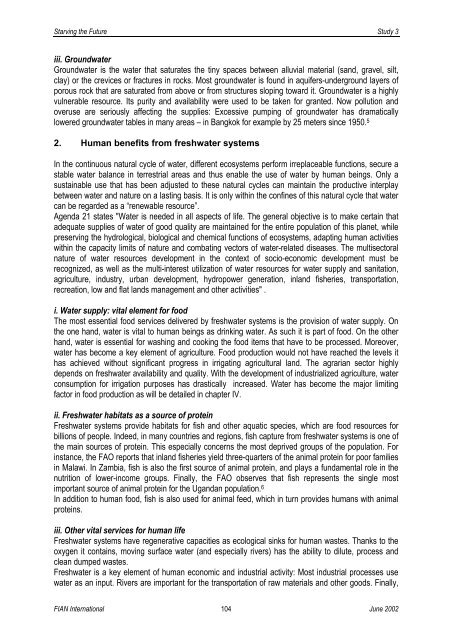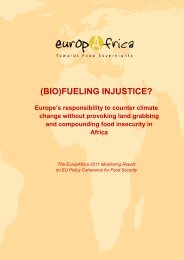Study 3: Ecodestruction and the Right to Food: The Cases of Water ...
Study 3: Ecodestruction and the Right to Food: The Cases of Water ...
Study 3: Ecodestruction and the Right to Food: The Cases of Water ...
You also want an ePaper? Increase the reach of your titles
YUMPU automatically turns print PDFs into web optimized ePapers that Google loves.
Starving <strong>the</strong> Future <strong>Study</strong> 3<br />
iii. Groundwater<br />
Groundwater is <strong>the</strong> water that saturates <strong>the</strong> tiny spaces between alluvial material (s<strong>and</strong>, gravel, silt,<br />
clay) or <strong>the</strong> crevices or fractures in rocks. Most groundwater is found in aquifers-underground layers <strong>of</strong><br />
porous rock that are saturated from above or from structures sloping <strong>to</strong>ward it. Groundwater is a highly<br />
vulnerable resource. Its purity <strong>and</strong> availability were used <strong>to</strong> be taken for granted. Now pollution <strong>and</strong><br />
overuse are seriously affecting <strong>the</strong> supplies: Excessive pumping <strong>of</strong> groundwater has dramatically<br />
lowered groundwater tables in many areas – in Bangkok for example by 25 meters since 1950. 5<br />
2. Human benefits from freshwater systems<br />
In <strong>the</strong> continuous natural cycle <strong>of</strong> water, different ecosystems perform irreplaceable functions, secure a<br />
stable water balance in terrestrial areas <strong>and</strong> thus enable <strong>the</strong> use <strong>of</strong> water by human beings. Only a<br />
sustainable use that has been adjusted <strong>to</strong> <strong>the</strong>se natural cycles can maintain <strong>the</strong> productive interplay<br />
between water <strong>and</strong> nature on a lasting basis. It is only within <strong>the</strong> confines <strong>of</strong> this natural cycle that water<br />
can be regarded as a “renewable resource”.<br />
Agenda 21 states "<strong>Water</strong> is needed in all aspects <strong>of</strong> life. <strong>The</strong> general objective is <strong>to</strong> make certain that<br />
adequate supplies <strong>of</strong> water <strong>of</strong> good quality are maintained for <strong>the</strong> entire population <strong>of</strong> this planet, while<br />
preserving <strong>the</strong> hydrological, biological <strong>and</strong> chemical functions <strong>of</strong> ecosystems, adapting human activities<br />
within <strong>the</strong> capacity limits <strong>of</strong> nature <strong>and</strong> combating vec<strong>to</strong>rs <strong>of</strong> water-related diseases. <strong>The</strong> multisec<strong>to</strong>ral<br />
nature <strong>of</strong> water resources development in <strong>the</strong> context <strong>of</strong> socio-economic development must be<br />
recognized, as well as <strong>the</strong> multi-interest utilization <strong>of</strong> water resources for water supply <strong>and</strong> sanitation,<br />
agriculture, industry, urban development, hydropower generation, inl<strong>and</strong> fisheries, transportation,<br />
recreation, low <strong>and</strong> flat l<strong>and</strong>s management <strong>and</strong> o<strong>the</strong>r activities" .<br />
i. <strong>Water</strong> supply: vital element for food<br />
<strong>The</strong> most essential food services delivered by freshwater systems is <strong>the</strong> provision <strong>of</strong> water supply. On<br />
<strong>the</strong> one h<strong>and</strong>, water is vital <strong>to</strong> human beings as drinking water. As such it is part <strong>of</strong> food. On <strong>the</strong> o<strong>the</strong>r<br />
h<strong>and</strong>, water is essential for washing <strong>and</strong> cooking <strong>the</strong> food items that have <strong>to</strong> be processed. Moreover,<br />
water has become a key element <strong>of</strong> agriculture. <strong>Food</strong> production would not have reached <strong>the</strong> levels it<br />
has achieved without significant progress in irrigating agricultural l<strong>and</strong>. <strong>The</strong> agrarian sec<strong>to</strong>r highly<br />
depends on freshwater availability <strong>and</strong> quality. With <strong>the</strong> development <strong>of</strong> industrialized agriculture, water<br />
consumption for irrigation purposes has drastically increased. <strong>Water</strong> has become <strong>the</strong> major limiting<br />
fac<strong>to</strong>r in food production as will be detailed in chapter IV.<br />
ii. Freshwater habitats as a source <strong>of</strong> protein<br />
Freshwater systems provide habitats for fish <strong>and</strong> o<strong>the</strong>r aquatic species, which are food resources for<br />
billions <strong>of</strong> people. Indeed, in many countries <strong>and</strong> regions, fish capture from freshwater systems is one <strong>of</strong><br />
<strong>the</strong> main sources <strong>of</strong> protein. This especially concerns <strong>the</strong> most deprived groups <strong>of</strong> <strong>the</strong> population. For<br />
instance, <strong>the</strong> FAO reports that inl<strong>and</strong> fisheries yield three-quarters <strong>of</strong> <strong>the</strong> animal protein for poor families<br />
in Malawi. In Zambia, fish is also <strong>the</strong> first source <strong>of</strong> animal protein, <strong>and</strong> plays a fundamental role in <strong>the</strong><br />
nutrition <strong>of</strong> lower-income groups. Finally, <strong>the</strong> FAO observes that fish represents <strong>the</strong> single most<br />
important source <strong>of</strong> animal protein for <strong>the</strong> Ug<strong>and</strong>an population. 6<br />
In addition <strong>to</strong> human food, fish is also used for animal feed, which in turn provides humans with animal<br />
proteins.<br />
iii. O<strong>the</strong>r vital services for human life<br />
Freshwater systems have regenerative capacities as ecological sinks for human wastes. Thanks <strong>to</strong> <strong>the</strong><br />
oxygen it contains, moving surface water (<strong>and</strong> especially rivers) has <strong>the</strong> ability <strong>to</strong> dilute, process <strong>and</strong><br />
clean dumped wastes.<br />
Freshwater is a key element <strong>of</strong> human economic <strong>and</strong> industrial activity: Most industrial processes use<br />
water as an input. Rivers are important for <strong>the</strong> transportation <strong>of</strong> raw materials <strong>and</strong> o<strong>the</strong>r goods. Finally,<br />
FIAN International 104<br />
June 2002
















